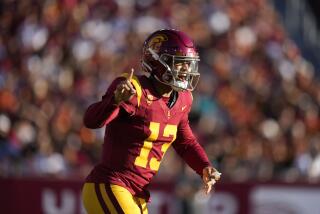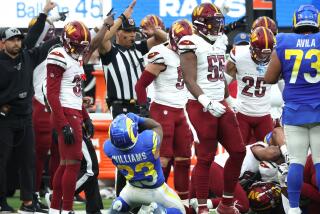Once More, Life Is Third and Long : For Injured Doug Williams, Pain Has Been Familiar Foe
- Share via
WASHINGTON — As Redskins quarterback Doug Williams’ stomach throbbed Wednesday night, he placed a telephone call to his 65-year-old father, sitting in a wheelchair back home in Zachary, La.
Robert Williams Sr. has no legs, a victim of an arthritis infection some six years ago, and his household duty is to sit by the telephone, just in case it rings. He used to hunt and fish, and he once grew a garden laden with flowers. Now, he answers the telephone.
So, he was the first to hear his 33-year-old son speak.
“I’m going to have an operation, Daddy,” Doug Williams said. “Need my appendix out.”
If there is a thing or two Robert Williams has taught his son, it’s to hold a heavy head high, no matter what. Doug Williams has had a lifelong need for that sort of guidance. His wife died of a brain tumor. He was involved in a bitter dispute with his first team, the Tampa Bay Buccaneers, and jumped to the U.S. Football League, which folded in a heap. He has had five knee operations, losing all semblance of cartilage from his scarred left knee.
On a scale of 1 to 10, then, his father said losing an appendix is probably a “3,” a “1” being not all that bad. Robert Williams said his son is saddened he won’t quarterback the Washington Redskins in Phoenix Sunday, but worse things could have happened.
“Doug is strong,” Robert Williams said Thursday. “It didn’t worry him too much. He was raised like this, I guess. You can’t worry about something if there’s no help for it.
“You think this is unfair? I don’t feel that way. Everybody has ups and downs in life. Way life is.”
Doug’s daughter Ashley, 5, has not yet adopted this philosophy, although her somewhat tragic legacy is bound to settle in someday as she ages. She never knew her mother, who died months after delivery with a brain tumor. If she is somewhat sheltered, the Williams’ have preferred to keep it that way, for they figure news of misfortune can wait.
Thursday morning, Doug Williams telephoned her in Louisiana as she dressed for school. He told her, “Daddy’s sick. He’s had an operation.”
According to Robert, little Ashley wasn’t sure what an operation was or what it all entailed or that it meant she couldn’t see her daddy on TV this Sunday.
“She didn’t understand it too much,” Robert said. “She doesn’t have a handle on it all yet. She’s not mature yet. I told her, ‘Daddy’s in the hospital and needs an operation.’ She asked, ‘What’s an operation?’ and I didn’t know how to explain it. I said he’s sick.”
On the day of the surgery, he hadn’t seemed ill in the least, answering a myriad of media questions prior to practice. “Are you playing poorly? . . . Do you think the team’s struggling? . . . Is Doug Williams the problem with this team?”
For an offensive player, he was a tad defensive, saying, “At no time has Coach Gibbs told me I’m not playing well.” At least he was responding. Half of his teammates weren’t available to be interviewed. He always is.
Williams has said one of the worst hours of his life came prior to January’s Super Bowl when a group of reporters, mostly white, asked him to describe life as a black man.
“I was under the microscope, being the first black quarterback there,” he said recently. “There’s only so many questions you can ask about being a black quarterback, but everybody found a new way of making me darker. ‘What does it mean being black? What does it mean being black and being in the Super Bowl? Do you think you have to carry all of black America? What do you think black people will say? Do you look at yourself as Jesse Jackson? Do you look at yourself as Martin Luther King? Do you know Jesse Owens?’ . . . That was the worst thing any individual can go through.”
What about losing his wife? He talks about it more easily now, as if he truly has accepted it. A picture of Ashley in his locker is a reminder. She has her mother’s eyes.
What about losing a league? Tampa Bay, his original team, spurned him, offering millions to unheralded quarterback Steve Young instead. He found a new league, the USFL. He was an Outlaw--an Oklahoma Outlaw.
Next thing he knew, the league folded, and he was perfectly willing to coach for a living, though the arm still worked. One team phoned, the Redskins, and they asked him if he could be content as a backup to Jay Schroeder. He said, sure.
He negotiated his own contract, though he forgot to ask for a signing bonus. He knocked again on General Manager Bobby Beathard’s door and said, “Is there any chance. . . . “
Beathard and owner Jack Kent Cooke said yes.
For the entire 1986 season, he threw one pass, dropped by the receiver. Schroeder went to the Pro Bowl; Williams went to Gibbs and asked for a trade. The coach thought better of it.
When Schroeder went down in a heap, Williams jogged in and made himself at home. A comeback victory over Philadelphia ensued, another against Detroit. He won a starting job, but--typically--he had back spasms before a critical game with the New York Giants. Unable to play, he watched Schroeder take the game and his job. He left Redskin Park in tears one night, his heavy head down for a change.
But he reigned in the Super Bowl, of course, and Schroeder was traded this fall. The Redskins were his Redskins. Owner Cooke gave him a million dollars. Gibbs gave him a mighty supporting cast. And then something gave his appendix a fit.
As Williams left Redskin Park for the hospital Wednesday, a young boy, wearing a Jay Schroeder T-shirt, asked for an autograph. His head up, Doug Williams signed.
More to Read
Go beyond the scoreboard
Get the latest on L.A.'s teams in the daily Sports Report newsletter.
You may occasionally receive promotional content from the Los Angeles Times.










